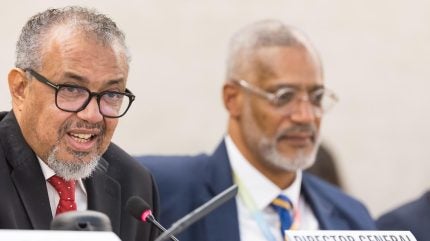
Member countries of the World Health Organization (WHO) will pay 20% more in membership fees as part of a revamped budget amid significant funding deficiencies due to the US withdrawal.
The ‘assessed contributions’ paid by WHO member states are a key source of funding for the organisation, though they cover a relatively small portion of the budget as a whole. Voluntary contributions from member states, philanthropic foundations, and private donors, among others, inject a large amount of cash into the annual budget. The higher fees for member states will add $90m in annual income to the WHO.

Discover B2B Marketing That Performs
Combine business intelligence and editorial excellence to reach engaged professionals across 36 leading media platforms.
The 2026-2027 annual budget was approved yesterday (20 May) at $4.2bn, a knockdown from the WHO’s previous aim of $5.3bn. The organisation stated the downsizing was due to “financial constraints”. It is also significantly down on the 2024-2025 budget of $6.8bn – the organisation approves its budget programme biennially.
The US, historically the largest financial contributor to the WHO, is set to withdraw from the organisation next year. Under former president Joe Biden, the US gave the WHO $1.28bn. This amounted to 12% of the WHO’s total budget and was far higher than China’s contribution of $157m. Current president Donald Trump, however, has significantly cut funding for foreign aid, prioritising domestic healthcare and has made his anti-WHO position evident; the country has not sent delegates to the ongoing 78th World Health Assembly in Geneva, Switzerland, where the membership fee increase was agreed.
In a statement, WHO said the increase “comes as governments are facing financial constraints and economic headwinds and demonstrates member states’ fundamental support for global health solidarity and the critical role of WHO”.
WHO has been working out how to diversify its funding pool and relieve pressure on the over-reliance from “a small set of traditional donors” since 2017. The membership increase in 2025 follows a similar one in 2022, to increase fees to represent 50% of WHO’s core budget by the 2030-2031 cycle. In the 2020-2021 budget, for example, these fees contributed only 16%.

US Tariffs are shifting - will you react or anticipate?
Don’t let policy changes catch you off guard. Stay proactive with real-time data and expert analysis.
By GlobalDataAlso announced today was a $170m funding raise at the assembly. Switzerland, Sweden, and Angola were among the member states with the highest contributions. Foundations involved in the round included the Novo Nordisk Foundation with $57m, along with $13m from the Children’s Investment Fund Foundation. China, which is set to become the largest contributor to the WHO after the US exit, also invested, but the amount is yet to be confirmed.




